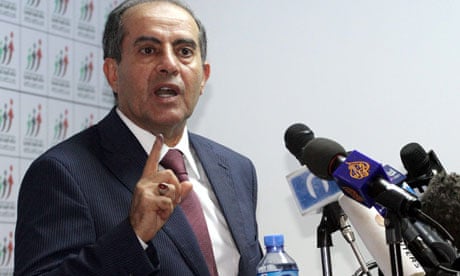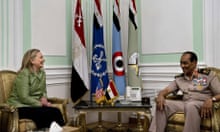Mahmoud Jibril, leader of the moderate pro-business National Forces Alliance that swept to a landslide victory against the Muslim Brotherhood in Libya's elections, is trying to assemble a ruling coalition this weekend, even as the last votes remain to be counted.
Election officials confirmed on Saturday that with 98% of votes from last weekend's election, the first in Libya for 48 years, the NFA and its allies won 17 of the 20 "super constituencies", with the Muslim Brotherhood's Justice and Construction party capturing only one.
"Nobody saw this coming," said Dirk Vandewalle, a US academic and former adviser to UN special envoy for Libya, Ian Martin. "The rule – all oil-exporting countries in the Middle East always being authoritarian – may have been proved wrong by Libya. There's a whole academic literature about this [and] it will have to be rewritten."
With the Justice and Construction party baffled at its failure to repeat the successes of Muslim Brotherhood parties in Egypt and Tunisia – fellow participants in last year's Arab spring – Jibril repeated calls for a grand coalition to rebuild Libya, but Brotherhood officials remain bitter.
Jibril, a US-educated economist, was once head of economic planning for the former dictator, Muammar Gaddafi, working with his son, Saif al-Islam, on a reformist constitution that was never implemented.
"Why were we put in prison in Libya and Jibril was working with Saif?" said Justice and Construction campaign manager El-Amin Belhaj. "Libyans do not want Sharia [law]. They want an economy."
But for the time being Libyans have turned their back on a party that seeks to mix religion and politics. "We want a guy who can manage," said Baha, a 20-year-old Tripoli medical student. "With the Brotherhood, the problem is we are already Islamic. We don't need someone to tell us how to be Islam."
With his mixture of moderate Islam and business knowhow, Jibril, 60, must still deal with the paradox that his support came evenly from communities that were both pro- and anti-Gaddafi in last year's war. "The debate is going to move away from Islamists-versus-liberals to former regime-versus-rebels," said Maryann Maguire, director of Intercultures, a UK-based risk management business.
Last week came a reminder of the depth of distrust, when two journalists from the former rebel town of Misrata were arrested in Bani Walid, a key Gaddafi stronghold in last year's revolution. Within days the town was surrounded by militia forces ready to fight.
On Saturday the standoff seemed destined for a negotiated settlement, but it is a reminder that Jibril must keep both sides happy in the months to come. He will be hoping that the solution lies in Libya's black gold.

